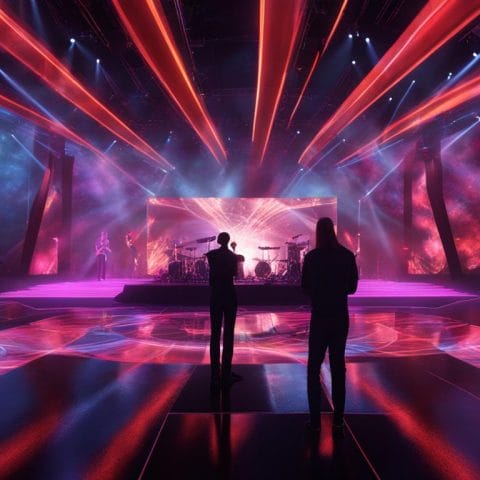The metaverse has taken the digital world by storm, presenting exciting opportunities for businesses to connect with consumers in new and immersive ways. As companies like Facebook and Microsoft invest in its development, it is clear that the metaverse is here to stay. In this article, we will delve into innovative strategies for marketing metaverse events, helping you unlock the vast potential of this virtual realm. From leveraging social media to forming strategic partnerships, we will explore how businesses can captivate and engage audiences in the metaverse.
Key Takeaways:
- Marketing in the metaverse offers unique opportunities to connect with consumers in immersive virtual environments.
- Leveraging social media and forming strategic partnerships are crucial for successful metaverse marketing.
- Understanding the metaverse and its potential is essential for developing effective marketing strategies.
- Designing immersive experiences and exploring monetization opportunities can elevate your brand’s presence in the metaverse.
- Mitigating risks, such as data privacy and customer experience management, is crucial for maintaining brand reputation in the metaverse.
What is the Metaverse?
The metaverse is a revolutionary concept that merges virtual reality technology with real-time interactions, creating a parallel virtual world that spans both the physical and virtual realms. It is a fully immersive environment where users can engage, explore, and interact with others through digital avatars. In the metaverse, individuals can participate in various activities such as virtual shopping, attending events, and even creating their own virtual identities.
Virtual reality technology plays a crucial role in bringing the metaverse to life. It allows users to experience a simulated world through virtual reality headsets, which provide a visual and auditory experience that mimics the real world. This technology enables users to feel as if they are physically present in the metaverse, enhancing their sense of immersion and realism.
The metaverse also encompasses a virtual economy, where users can buy, sell, and trade virtual assets. This virtual economy is often powered by cryptocurrency and digital assets like nonfungible tokens (NFTs). These digital assets have unique properties and can represent anything from virtual land and virtual goods to exclusive digital artwork and collectibles. The virtual economy provides opportunities for businesses to monetize their offerings and for individuals to participate in the digital marketplace.
| Metaverse Definition | Virtual Reality Technology | Virtual Economy | Virtual Identities |
|---|---|---|---|
| The metaverse is a parallel virtual world that combines immersive environments, such as virtual and augmented reality, with real-time interactions. | Virtual reality technology plays a crucial role in bringing the metaverse to life, providing a visual and auditory experience that mimics the real world. | The metaverse encompasses a virtual economy powered by cryptocurrency and digital assets like nonfungible tokens (NFTs). | In the metaverse, users can create virtual identities and interact with others through digital avatars. |
The Growing Importance of Marketing in the Metaverse
The metaverse is quickly gaining traction, with significant investment and a projected market value of trillions of dollars. According to recent data, investments in the metaverse have surpassed billions of dollars, with major players like Facebook’s Meta leading the way. As consumer behavior continues to shift towards online experiences, marketing in the metaverse has become essential for brands to stay relevant and reach their target audiences.
One of the key reasons behind the growing importance of marketing in the metaverse is the immense market value it offers. As more people embrace virtual reality and immersive experiences, the metaverse presents new avenues for businesses to connect, engage, and monetize their offerings. Brands that recognize this potential and invest in metaverse marketing strategies can tap into a vast market and gain a competitive advantage over their rivals.
Furthermore, the metaverse offers a unique opportunity for brands to stay at the forefront of digital marketing trends. As technology continues to evolve, staying up to date with the latest digital marketing strategies is crucial for businesses. By embracing the metaverse, brands can experiment with cutting-edge technologies, leverage augmented reality and virtual reality to deliver immersive experiences, and explore new ways to connect with their target audience.
Defining Your Metaverse Marketing Goals
Before diving into metaverse marketing, it’s crucial to define your goals and objectives. Understanding what you want to achieve will guide your strategy and ensure you’re targeting the right audience. When setting your metaverse marketing objectives, consider the following:
- Increased Brand Awareness: If your goal is to boost brand visibility and recognition in the metaverse, focus on strategies that will help you reach a wide audience and make a memorable impact.
- Audience Targeting: Understanding your target audience is essential for effective metaverse marketing. Research their preferences, interests, and behaviors to tailor your campaigns and create content that resonates with them.
- Brand Positioning: Consider how your brand aligns with the metaverse environment and the values of your target market. Position yourself as a leader, innovator, or supporter of the metaverse to appeal to the audience you want to attract.
By clearly defining your metaverse marketing goals, you can develop a focused strategy that drives results and helps your brand thrive in this emerging digital landscape.
Example Use Case: Increasing Brand Awareness
“Our objective is to increase brand awareness among tech-savvy Gen Z and millennial audiences in the metaverse. We want to position our brand as a leader in the virtual reality space and create a strong association between our products and the immersive experiences of the metaverse. Through targeted advertising campaigns on metaverse platforms and partnerships with influential metaverse creators, we aim to reach a wide audience and generate buzz around our brand.”
| Objective | Target Audience | Strategy | KPIs |
|---|---|---|---|
| Increased Brand Awareness | Tech-savvy Gen Z and millennials | Targeted advertising, partnerships with metaverse creators | Brand mentions, engagement metrics, website traffic |
| Audience Targeting | Metaverse users with specific interests | Data-driven targeting, personalized content | Click-through rates, conversions, user retention |
| Brand Positioning | Metaverse community, tech enthusiasts | Sponsorships, thought leadership content | Brand sentiment, thought leadership recognition |
By aligning your metaverse marketing objectives with your target audience and brand positioning, you can develop a roadmap for success and achieve your desired outcomes in the metaverse.
Identifying the Right Platforms for Metaverse Marketing

In the metaverse, there are various platforms available for effective marketing strategies. It is essential to identify the right platforms that align with your brand and target audience. Some popular choices include Roblox, Fortnite, Decentraland, and Minecraft. Each platform offers unique features and benefits, so it’s crucial to assess which platform suits your brand’s goals and objectives.
Table: Metaverse Marketing Platforms
| Platform | Features | Benefits |
|---|---|---|
| Roblox | Allows users to create and play games, socialize, and explore virtual worlds. | Large user base, immersive experiences, and built-in monetization options. |
| Fortnite | An online multiplayer game that offers various virtual events and experiences. | High user engagement, strong community, and opportunities for live concerts and collaborations. |
| Decentraland | A decentralized virtual reality platform where users can create, explore, and trade virtual land and items. | Ownership of virtual assets, real-world integration, and potential for cross-platform interactions. |
| Minecraft | A sandbox game that allows players to build and explore virtual worlds. | Large user base, creative possibilities, and opportunities for educational and branded experiences. |
By collaborating with these platforms and exploring partnerships, you can expand your reach and create immersive experiences that resonate with your target audience. Selecting the right platforms will play a vital role in the success of your metaverse marketing efforts.
“The metaverse offers endless possibilities for marketing and engagement. By leveraging the right platforms, brands can tap into a vast audience base and create unique experiences that captivate users.”
Designing Immersive Experiences for Metaverse Marketing

In the metaverse, creating immersive experiences is key to capturing the attention and engagement of users. By designing virtual stores, branded events, and interactive environments, brands can provide users with unique and memorable experiences that leave a lasting impression.
One effective strategy for immersive metaverse marketing is to create virtual stores that allow users to browse and shop for products in a virtual environment. These stores can be customized to reflect the brand’s aesthetic and offer a seamless shopping experience. Users can explore the virtual store, interact with products, and make purchases using virtual currencies or real-world transactions. This allows brands to showcase their products in a creative and interactive way, enhancing the overall customer experience in the metaverse.
Example: Vans Interactive Skatepark in Roblox
“Vans created an interactive skatepark in Roblox, allowing users to explore skate sites, customize skateboards, and earn virtual rewards.”
Another way to design immersive experiences is through branded events. Brands can host virtual events that offer users a chance to participate in unique activities, engage with brand ambassadors, and connect with like-minded individuals within the metaverse. These events can include live performances, virtual workshops, and interactive games, allowing users to immerse themselves in the brand’s world while fostering a sense of community.
By designing immersive experiences in the metaverse, brands can create a deeper level of engagement with their audience. These experiences go beyond traditional marketing tactics and allow users to actively participate and interact with the brand, fostering a stronger connection and leaving a lasting impression.
Monetization Opportunities in the Metaverse
The metaverse presents a plethora of monetization opportunities for brands looking to tap into this emerging digital landscape. While the primary focus may not be direct sales, there are various avenues for generating revenue and engaging with virtual audiences. From direct-to-avatar sales to the virtual goods market, brands can leverage these opportunities to enhance their presence and drive growth.
One key monetization avenue in the metaverse is through direct-to-avatar sales. Brands can sell virtual goods and products directly to avatars, allowing users to enhance their virtual experiences and express their personal style. Whether it’s clothing, accessories, or digital art, virtual items can hold significant value in the metaverse, creating a lucrative market for brands to explore.
“The metaverse offers an exciting opportunity for brands to tap into the growing virtual goods market. By leveraging the demand for unique and valuable digital assets, brands can create a new revenue stream and engage with consumers on a deeper level.” – Marketing Expert
Additionally, brands can explore the virtual goods market, where users can purchase and trade digital collectibles and possessions. Nonfungible tokens (NFTs) play a significant role in this market, providing authenticity and scarcity to virtual items. Brands can leverage NFTs to create exclusive branded collectibles, offering unique experiences and value to metaverse users.
The Virtual Goods Market: Key Statistics
| Statistic | Value |
|---|---|
| Projected market value by 2025 | $400 billion |
| Number of active NFT wallets in Q3 2021 | 1.6 million |
| Top-selling NFT categories | Art, gaming, collectibles |
Brands like Gucci and Nike have already ventured into the virtual goods market, offering branded products and unique digital experiences to metaverse users. By embracing these monetization opportunities, brands can establish a presence in the metaverse and tap into the growing demand for virtual experiences and possessions.
- Direct-to-avatar sales offer a way for brands to sell virtual goods directly to avatars, enhancing their virtual experiences and allowing users to express their personal style.
- The virtual goods market, driven by nonfungible tokens (NFTs), provides a platform for brands to create and sell unique digital collectibles and possessions.
- Brands can leverage NFTs to offer exclusive branded collectibles, creating value and scarcity in the metaverse.
By capitalizing on these monetization opportunities, brands can not only generate revenue but also establish a stronger presence in the metaverse and connect with virtual audiences on a deeper level.
Collaborating and Partnering for Metaverse Success
Collaboration and partnerships are essential elements for achieving success in metaverse marketing. By working with developer communities and independent creators, brands can tap into a network of innovative minds and expand their presence in the metaverse. These partnerships can bring fresh perspectives, unique ideas, and technical expertise to enhance the brand’s offerings and create exciting experiences. Additionally, collaborating with influencers and celebrities who are actively engaged in the metaverse can provide access to a wider audience and boost brand engagement.
Partnering with developer communities allows brands to leverage the collective creativity and skills of a passionate community. These communities are often at the forefront of metaverse development, constantly exploring new technologies and pushing boundaries. By fostering relationships with these communities, brands can gain valuable insights, receive feedback on their offerings, and create mutually beneficial partnerships.
Influencer collaborations are also powerful tools for metaverse marketing. Influencers have established themselves as trusted voices within the metaverse community and can help promote a brand’s products, events, or experiences. Their endorsement can significantly impact consumer behavior and increase brand visibility. By partnering with influencers, brands can tap into their networks, engage with their followers, and amplify their reach.
When forming partnerships in the metaverse, it is crucial to align with creators and influencers whose values and interests align with the brand’s vision. Authenticity and genuine enthusiasm are key factors in successful collaborations. Brands should actively seek out opportunities to connect with others in the metaverse ecosystem and build strategic partnerships that not only benefit their business but also contribute to the overall growth and development of the metaverse as a whole.
Mitigating Risks in Metaverse Marketing
The metaverse presents exciting opportunities for brands to connect with consumers in new and immersive ways. However, like any marketing endeavor, there are risks involved. To ensure a successful metaverse marketing strategy, it’s essential to be proactive in mitigating these risks and maintaining a safe and enjoyable user experience.
One of the main risks in metaverse marketing is managing brand reputation. As the metaverse evolves, it’s crucial to establish guidelines and policies for customer experience management. This includes addressing issues such as intellectual property management, data privacy, and misinformation. By setting clear expectations and ensuring that customers have a positive experience, brands can safeguard their reputation and maintain customer trust.
Data privacy is another critical consideration in the metaverse. Brands must handle user data responsibly and comply with relevant privacy regulations. This includes obtaining proper consent for data collection and ensuring secure storage and transmission of data. By prioritizing data privacy, brands can build trust with their audience and avoid potential legal and reputational risks.
“In the metaverse, brands must be vigilant in protecting their customers’ data and ensuring a safe environment. By implementing robust data privacy measures and being transparent about how data is collected and used, brands can build trust and loyalty among their users.”
In addition to data privacy, brands also need to consider the risk of cybersecurity threats. With the increasing integration of virtual and augmented reality technologies in the metaverse, it’s essential to implement robust security measures to protect users from cyberattacks and unauthorized access. Regular monitoring and updates to security protocols can help mitigate these risks and provide a secure environment for brand interactions.
To summarize, metaverse marketing comes with its share of risks, including managing brand reputation, data privacy, and cybersecurity threats. By being proactive in mitigating these risks and prioritizing customer experience management, brands can navigate the metaverse successfully and create a safe and enjoyable environment for their audience.
Harnessing SEO for Metaverse Marketing
Search engine optimization (SEO) is a crucial element in driving organic visibility and traffic to metaverse marketing initiatives. By implementing effective SEO strategies, businesses can enhance their online presence and connect with their target audience in the immersive virtual world. In this section, we will explore the key strategies for harnessing SEO in metaverse marketing, including visual search optimization and local SEO.
Visual Search Optimization
Visual search optimization is an emerging trend in the metaverse that allows users to search for content using images rather than text. As the metaverse relies heavily on visual elements, optimizing your content for visual search can significantly improve its discoverability. To optimize for visual search, ensure that your images are high-quality, properly labeled with descriptive alt tags, and optimized for fast loading times.
In addition, consider incorporating visual search features into your metaverse marketing efforts. For example, you can create interactive experiences where users can search for products or information by uploading images or using augmented reality (AR) technology. By embracing visual search optimization, you can enhance user experiences and drive targeted traffic to your metaverse events and venues.
Local SEO in the Metaverse
Local SEO is an essential strategy for businesses looking to reach geographically targeted audiences. In the metaverse, where virtual venues and events can mimic real-world locations, local SEO can be leveraged to attract users in specific regions. To optimize for local SEO in the metaverse, consider the following:
- Create virtual venues that mirror real-world locations and optimize their descriptions with relevant keywords and location-specific information.
- Engage with local metaverse communities and directories to increase your brand’s visibility.
- Encourage user-generated content and reviews for your metaverse venues to boost local search rankings.
- Utilize geotargeting features to deliver personalized content and promotions to users based on their virtual location.
Table: Metaverse SEO Strategies
| Strategy | Description |
|---|---|
| Optimize Metaverse Content | Optimize your metaverse content with relevant keywords, meta tags, and descriptions to improve its search visibility. |
| Build Backlinks | Generate high-quality backlinks from reputable metaverse blogs, forums, and websites to enhance your metaverse marketing efforts. |
| Monitor Analytics | Regularly monitor your metaverse analytics to track keywords, user engagement, and traffic sources, enabling data-driven decision-making. |
| Create Shareable Content | Produce compelling and shareable content that resonates with your target audience, increasing the likelihood of engagement and backlinks. |
By implementing these SEO strategies, businesses can maximize their visibility and reach in the metaverse, attracting and engaging with their target audience effectively.
Conclusion
Marketing in the metaverse presents exciting possibilities for businesses to connect with consumers in a new and immersive way. By understanding the metaverse, setting clear marketing goals, identifying the right platforms, designing immersive experiences, exploring monetization opportunities, collaborating with others, mitigating risks, and leveraging SEO strategies, brands can establish a strong presence in the metaverse and unlock its vast potential.
As the metaverse continues to evolve, it is essential for marketers to embrace this emerging digital landscape and adapt their strategies to stay ahead of the curve. The metaverse offers unprecedented opportunities to engage with audiences on a deeper level and create unforgettable experiences. By harnessing the power of the metaverse, brands can build stronger connections with their target market and drive brand growth.
With the metaverse becoming an increasingly prominent part of the digital landscape, it is crucial for businesses to stay informed and agile. By continuously monitoring trends, exploring new technologies, and staying up to date with consumer behaviors, marketers can ensure they are maximizing their impact in the metaverse. The future of marketing lies in the metaverse, and those who embrace it will be well positioned to thrive in this exciting new frontier.
FAQ
What is the metaverse?
The metaverse refers to an immersive virtual world where people can interact, shop, and engage with others through avatars. It combines virtual and augmented reality and spans both the physical and virtual worlds.
Why is marketing in the metaverse important?
Marketing in the metaverse is essential for brands to stay relevant and reach their target audiences as consumer behavior shifts towards online experiences. It can lead to increased brand awareness, engagement, and revenue generation.
How can I define my metaverse marketing goals?
To define your metaverse marketing goals, consider what you want to achieve, whether it’s increasing brand awareness, generating favorable sentiment, or promoting loyalty. Understand your target audience and their preferences to tailor your strategies effectively.
Which platforms should I use for metaverse marketing?
Popular platforms for metaverse marketing include Roblox, Fortnite, Decentraland, and Minecraft. Assess which platforms align best with your brand and target audience to determine the right ones for your marketing efforts.
How can I create immersive experiences for metaverse marketing?
Designing virtual stores, events, and interactive environments can help create memorable experiences for users. Combining native advertising and branded activations can further enhance engagement and drive brand loyalty.
How can I monetize in the metaverse?
Brands can sell virtual goods directly to avatars and tap into the growing market for digital collectibles and virtual possessions. Leveraging nonfungible tokens (NFTs) can provide authenticity and value to these virtual items.
How important are collaborations and partnerships in metaverse marketing?
Collaboration and partnerships play a crucial role in metaverse marketing success. Working with developer communities, independent creators, influencers, and celebrities can help expand your brand presence and create new and exciting experiences.
What risks should I be aware of in metaverse marketing?
Mitigating risks such as customer experience, intellectual property management, data privacy, and misinformation is crucial to maintain brand reputation and customer trust. Proactive planning and continuous monitoring are essential in navigating potential challenges in the metaverse.
How can SEO help in metaverse marketing?
SEO strategies tailored to the metaverse can drive organic visibility. Optimizing your presence across platforms, enhancing visual search optimization, and incorporating local SEO tactics can help improve brand visibility and drive targeted traffic to virtual venues and events.





